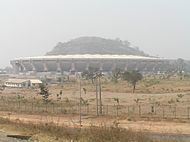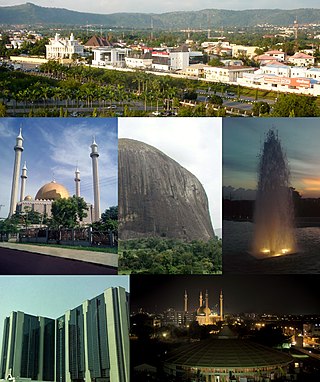
Abuja is the capital and eighth most populous city of Nigeria. Situated in the middle of the country within the Federal Capital Territory (FCT), it is a planned city built mainly in the 1980s based on a master plan by International Planning Associates (IPA), a consortium of three American planning and architecture firms made up of Wallace, Roberts, McHarg & Todd as the lead, Archi systems International, and Planning Research Corporation. The Central Business District of Abuja was designed by Japanese architect Kenzo Tange. It replaced Lagos, the country's most populous city, as the capital on 12 December 1991.

Ibrahim Badamasi Babangida is a Nigerian retired general and statesman who served as military president of Nigeria from 1985 until his resignation in 1993. He rose through the ranks to serve from 1984 to 1985 as Chief of Army Staff, going on to orchestrate his seizure of power in a coup d'état against Muhammadu Buhari.

Chief Moshood Kashimawo Olawale Abiola, also known as M. K. O. Abiola was a Nigerian businessman, publisher, and politician. He was the honorary supreme military commander of the Oyo Empire and an aristocrat of the Egba clan.

Babagana Kingibe OV GCON is a Nigerian diplomat, politician and civil servant who has held several high ranking government offices, culminating in his appointment as the Secretary to the Government of the Federation from 2007 to 2008. He spent over a decade in the Foreign Service cadre and has been in politics since the 1970s serving six heads of state; most recently as a member of the inner circle of President Muhammadu Buhari.
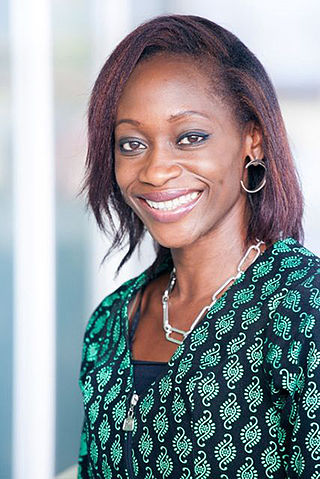
Hafsat Olaronke Abiola-Costello, in Lagos, is a Nigerian human rights, civil rights and democracy activist, founder of the Kudirat Initiative for Democracy (KIND), which seeks to strengthen civil society and promote democracy in Nigeria. She is President of Women in Africa Initiative (WIA), international platform for the economic development and support of African women entrepreneurs. She is also one of the founders of Connected Women Leaders (CWL).
Democracy Day is a national public holiday in Nigeria to commemorate the restoration of democracy in 1999, commemorated on 12 June. Until 2018, it was celebrated annually on May 29. It is a tradition that has been held annually, beginning in year 2000. June 12 was formerly known as Abiola Day, celebrated in Lagos and some south western states of Nigeria.

The Third Republic was the planned republican government of Nigeria in 1992 which was to be governed by the Third Republican constitution. In the Third Republic, there were democratically elected state governors and state assemblies and a democratically elected federal legislature. The republic was however not fully democratic as there was no democratically elected civilian president. The then military president Ibrahim Babangida's supposed transition eventually turned out to be a ploy to keep executive powers and grant the National Assembly limited legislative powers. Hence all laws passed by the Senate and House of Representatives will have to pass the National Defence and Security Council of Nigeria and finally approved by the President. So while Babangida changed the usual style adopted by preceding military leaders from Head of State to President, he will continue to postpone presidential elections and eventually annul the ultimate one held on 12 June 1993. The Third Republic can thus be described as half military and half civilian.

Kayode Oladele is a Nigerian human rights activist, lawyer and politician who was a member of the Nigerian House of Representatives representing Yewa North/Imeko-Afon Federal Constituency, Ogun State, from 2015–2019. He was the Chairman of the House of Representatives' Committee on Financial Crimes and member of the House Committees on Justice, Human Rights, Rules and Business, Environment, Healthcare Services and Agricultural Institutions. He was elected under the platform of the All Progressives Congress on 11 April 2015. Prior to that, he was Chief of Staff, office of the Chairman, Economic and Financial Crimes Commission (EFCC), a law enforcement agency that investigates financial crimes.
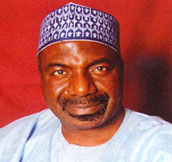
Isaiah Chawai Balat was a Nigerian politician and businessman from southern Kaduna State. He was the Senator of the Federal Republic of Nigeria representing Kaduna South Senatorial District from May 2003 to May 2007 and, a member of the People's Democratic Party. Prior to his election to the Senate, he served as the Minister of State for Works and Housing in the cabinet of President Olusegun Obasanjo from 1999 to 2000. In May 2010, Balat was appointed the Special Advisor to the President on Special Duties where he served until his demise in 2014.

Chief Dele Momodu is a Nigerian journalist/publisher, businessman, and motivational speaker. He is the CEO and publisher of Ovation International, a magazine that has given publicity to people from all over the world, mainly in Africa. In 2015, he officially launched Ovation TV and subsequently launched an online newspaper called The Boss Newspapers. Momodu has received hundreds of awards and honors for his work in the world of business, politics, literature, the music industry and the fashion industry. He writes a weekly column called "Pendulum", published every Saturday on the back page of Thisday newspaper. The articles are praised for highlighting issues in Nigeria, as well as discussing popular topics, current events and notable people, often in a polemic/critical style. ,

Presidential elections were held in Nigeria on 12 June 1993, the first since the 1983 military coup ended the country's Second Republic. The elections was the outcome of a transitional process to civilian rule spearheaded by the military ruler, Ibrahim Badamasi Babangida. The unofficial result of the election – though not declared by the National Electoral Commission (NEC) – indicated a victory for Moshood Kashimawo Olawale Abiola of the Social Democratic Party (SDP), who defeated Bashir Tofa of the National Republican Convention (NRC). The winner of the election was thus never declared as the elections were annulled by Babangida, citing electoral irregularities. The annulment led to protests and political unrest, including the resignation of Babangida and a weak interim civilian government, and culminated in the continuation of military rule in the country with Sani Abacha ascending to power as the military head of state via a bloodless coup later in the year.
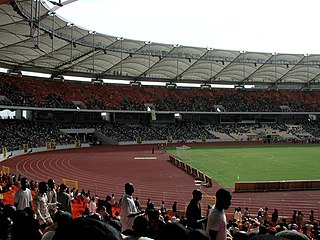
The 2004 CAF Champions League Final was the final of the 2004 CAF Champions League.
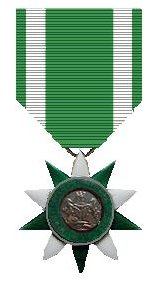
The Order of the Federal Republic (OFR) is one of two orders of merit, established by the Federal Republic of Nigeria in 1963. It is senior to the Order of the Niger.
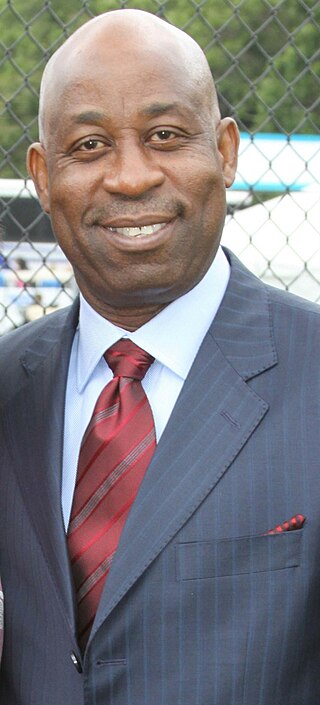
Henry Dele Alake ; born 6 October 1956) is a Nigerian journalist, activist and technocrat who is the current Nigerian minister of Solid Minerals. He is a former commissioner for Information and Strategy of Lagos State serving from 1999 to 2007.
Michael Opeyemi Bamidele popularly known as MOB, is a Nigerian lawyer, human right activist, and politician who is currently serving as the majority leader of the Nigerian Senate since 2023. He has represented Ekiti Central senatorial district in the Nigerian Senate since 2019.

The MKO Abiola Statue was designed and erected by Olurotimi Ajayi in memory of Chief Moshood Abiola, a politician who was widely regarded as the winner of the inconclusive 1993 Nigerian elections. Standing at about 46 feet tall, the statue was unveiled on 12 June 2018 during the administration of Governor Akinwunmi Ambode.

Omoyele Yele Sowore is a Nigerian politician, human rights activist, citizen reporter, writer, lecturer and pro-democracy campaigner, known for founding the online news agency Sahara Reporters. In August 2018, he founded the African Action Congress party and ran as its presidential candidate in the 2019 Nigerian general election. Sowore also ran for President in the 2023 Nigerian General elections.
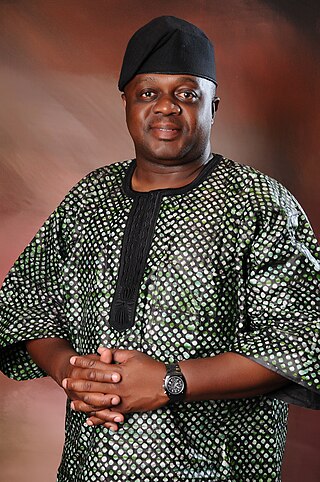
Olanrewaju Adeyemi Tejuoso is a Nigerian politician. He was a senator from Ogun State at the 8th Assembly.
Group A of the 2023 Africa Cup of Nations qualification tournament was one of the twelve groups that decided the teams which qualified for the 2023 Africa Cup of Nations finals tournament. The group consisted of four teams: Nigeria, Sierra Leone, Guinea-Bissau and São Tomé and Príncipe.





